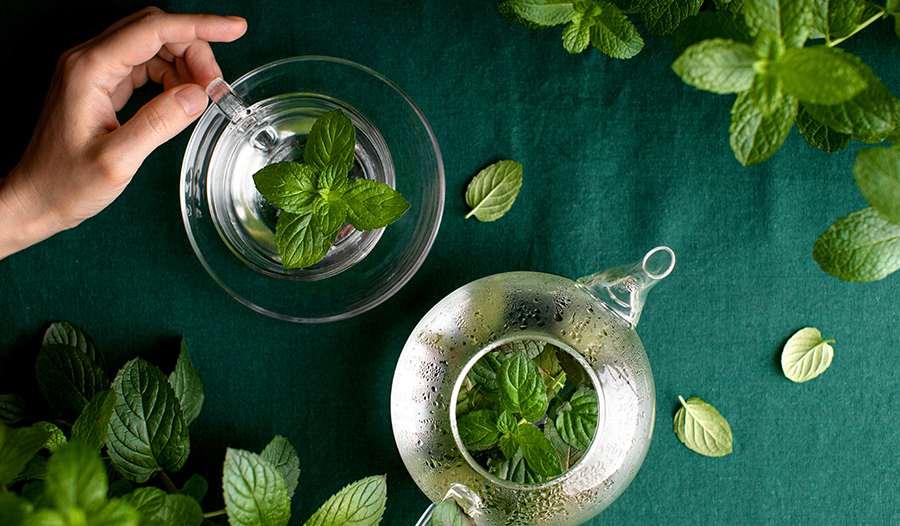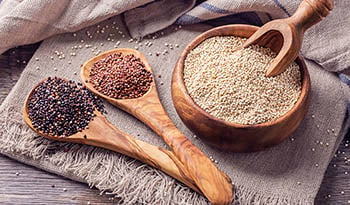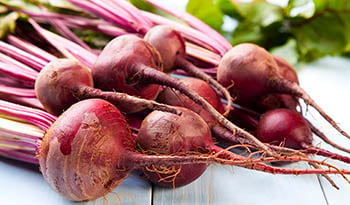5 Incredible Spearmint Tea Benefits from Acne to Digestion
إخلاء مسؤولية:لا تهدف هذه المدونة إلى تقديم التشخيص...
- في هذا المقال:
- Spearmint Tea May Benefit Polycystic Ovary Syndrome
- Spearmint Tea May Help Reduce Acne
- Spearmint Tea May Help Decrease Hirsutism
- Spearmint May Help Improve Memory
- Spearmint Tea May Help Aid Digestion
- Side Effects of Spearmint Tea
- Takeaway

Spearmint has been used for centuries for medicinal purposes in many cultures. From Traditional Iranian Medicine to Traditional Chinese Medicine, spearmint tea has consistently been used for a wide variety of ailments and disorders.
In more recent times, spearmint tea has gained a reputation for its potential benefits to those struggling with hormonal and endocrine disorders like Polycystic Ovary Syndrome (PCOS).
Research even suggests that spearmint tea may be beneficial for improving acne caused by an imbalance in hormones.
While spearmint tea may be known more for its modern applications of potentially benefitting hormonal disorders, studies suggest that spearmint may have many more health benefits.
Spearmint Tea May Benefit Polycystic Ovary Syndrome
Polycystic Ovary Syndrome, also known as PCOS, is a condition that involves hormonal imbalances that contribute to enlarged ovaries that develop cysts. PCOS symptoms may also include irregular periods, abnormal body hair growth, weight gain, acne, insulin resistance, and even infertility.
Research indicates that PCOS is due to an increase in male reproductive hormones or androgens in females. While the cause of PCOS has not been discovered yet, research suggests that the condition may be due to a combination of genetic and environmental factors.
Studies suggest that spearmint is an anti-androgenic herb and that spearmint tea may benefit PCOS. One single-blind randomized clinical trial focused on 60 women with PCOS who had been diagnosed as infertile.
The participants were also interested in becoming pregnant. The study separated participants into 1 of 3 groups: a group that received the medication clomiphene, a group that received an herbal mixture that included spearmint, ginger, and cinnamon, and a group that received both clomiphene and the spearmint herbal mixture.
Each group received their intervention for 3 months. The study found that the groups that received the herbal spearmint mixture had less oxidative stress and better fasting blood glucose levels.
The study also found that insulin levels were lower in the spearmint group compared to the clomiphene group. Insulin is a hormone that helps to take blood sugar from the bloodstream into the cells to use for fuel. Individuals with PCOS tend to have higher levels of insulin in their bloodstream and insulin resistance.
Studies also suggest that spearmint may help to decrease ovarian cysts in PCOS. One animal study found that a combination of both spearmint and flaxseed helped to reduce the number of ovarian cysts.
Spearmint Tea May Help Reduce Acne
One of the symptoms of PCOS may be skin blemishes and acne. PCOS is associated with acne because of an increase in androgens. An increase in androgens is often associated with increased skin oil or sebum, which may contribute to acne.
Studies suggest that spearmint tea may help improve acne associated with PCOS. Since spearmint is often considered to be an anti-androgenic herb, much like licorice or green tea, spearmint may help to prevent acne by lowering acne-contributing androgens in the body.
Another way spearmint may help to decrease acne lesions is attributed to its potential antibacterial properties. Studies suggest that acne may be caused, in part, by an imbalance in the skin microbiome. This imbalance occurs when species of bacteria like C. acnes and S. epidermidis multiply concerning other microorganisms that live on the skin.
With resistance to conventional methods like antibiotics increasing, other methods like probiotics and spearmint tea are gaining interest. Studies show that spearmint may act as an antibiotic to certain bacteria that may contribute to acne, like S. epidermidis.
While spearmint may be a promising herb to use for the reduction of acne, more studies are needed to truly understand the potential of this amazing herb.
Spearmint Tea May Help Decrease Hirsutism
Hirsutism is a condition characterized by abnormal and excessive hair growth, especially in women. With hirsutism, abnormal and thick hair growth may be anywhere on the body, but it is most often on the face and chin of women.
Research shows that hirsutism is most often caused by an excess amount of male hormones or androgens.
Studies suggest that spearmint tea may help improve hirsutism. One randomized placebo-controlled trial focused on 42 participants with hirsutism.
The study followed the participants for 30 days to assess the effects of spearmint tea on hirsutism. The participants drank 1 cup of spearmint tea two times a day for a month. After 30 days that study found that the participants in the spearmint tea had lower testosterone blood levels and higher luteinizing (LH) and follicle-stimulating hormones (FSH).
Testosterone is a primarily male hormone that may contribute to hirsutism if found in high levels in females. LH and FSH are hormones that help to regulate the menstrual cycle.
The participants also reported a subjective improvement in their hirsutism, although objective tests didn’t find a significant change within the study timeframe.
Spearmint May Help Improve Memory
Studies suggest that spearmint may act as a nootropic. Nootropics, like bacopa or ginkgo biloba, are substances that may help to enhance cognition, increase focus, and improve memory.
One double-blind, randomized, placebo-controlled study focused on the effects of spearmint on working memory. The study involved 90 participants with memory impairment that was associated with age. The participants were roughly 60 years old.
Participants were placed in a spearmint group or a placebo group and took 2 capsules of spearmint once a day for 90 days. At the end of the study, those in the spearmint group were found to have better working memory and spatial memory compared to placebo.
The spearmint intervention group also reported an easier ability to fall asleep compared to the placebo group.
Another double-blind, randomized, placebo-controlled study focused on the effects of spearmint on cognition in 142 healthy, active adults. Participants took a spearmint supplement or placebo for 90 days.
After the study, those in the spearmint group had better outcomes associated with sustained attention and focus than the placebo group.
Spearmint Tea May Help Aid Digestion
Many traditional medicinal systems, from Traditional Iranian Medicine and Traditional Chinese Medicine to Ayurveda, have used spearmint for digestive issues.
Studies may support these claims. One clinical study compared the effects of spearmint against peppermint for functional dyspepsia. Functional dyspepsia is an upset stomach that has no known or obvious cause. Symptoms of functional dyspepsia include stomach pain, flatulence, nausea, bloating, and feeling full after eating only small amounts of food.
The study involved 79 participants who suffered from functional dyspepsia. Participants were either assigned to receive a peppermint or spearmint intervention for 5 days.
After the study, both spearmint and peppermint performed equally in reducing the symptoms of pain, fullness, nausea, bloating, and flatulence. Spearmint proved to be more effective than peppermint in reducing vomiting.
Another single-blind clinical study focused on the effects of spearmint against dimethicone for flatulence. A total of 60 participants with irritable bowel syndrome either received dimethicone or spearmint after each meal for 3 weeks.
After the study, spearmint was found to work better than dimethicone for flatulence. Furthermore, the study states that there were no adverse events or side effects among participants.
Side Effects of Spearmint Tea
Spearmint is often Generally Recognized As Safe (GRAS) for human consumption in foods, beverages, and pharmaceuticals. Safety studies have found no adverse changes to thyroid stimulating hormone, liver and kidney function, or lipid profiles in individuals taking up to 900 milligrams of spearmint per day for 90 days. Some side effects that may occur with spearmint could be allergic reactions in sensitive individuals. Spearmint may also act as a mild sedative and may be calming.
Takeaway
Spearmint tea may have many potential benefits that range from balancing hormones to improving memory. Spearmint has been used for centuries safely as a tasty way to potentially improve overall wellness.
References:
- Ainehchi N, Khaki A, Farshbaf-Khalili A, Hammadeh M, Ouladsahebmadarek E. The Effectiveness of Herbal Mixture Supplements with and without Clomiphene Citrate in Comparison to Clomiphene Citrate on Serum Antioxidants and Glycemic Biomarkers in Women with Polycystic Ovary Syndrome Willing to be Pregnant: A Randomized Clinical Trial. Biomolecules. 2019;9(6):215. Published 2019 Jun 3. doi:10.3390/biom9060215
- Ali-Shtayeh MS, Jamous RM, Abu-Zaitoun SY, Khasati AI, Kalbouneh SR. Biological Properties and Bioactive Components of Mentha spicata L. Essential Oil: Focus on Potential Benefits in the Treatment of Obesity, Alzheimer's Disease, Dermatophytosis, and Drug-Resistant Infections. Evid Based Complement Alternat Med. 2019;2019:3834265. Published 2019 Oct 20. doi:10.1155/2019/3834265
- Ashkar F, Rezaei S, Salahshoornezhad S, et al. The Role of medicinal herbs in treatment of insulin resistance in patients with Polycystic Ovary Syndrome: A literature review. Biomol Concepts. 2020;11(1):57-75. Published 2020 Mar 26. doi:10.1515/bmc-2020-0005
- Dessinioti C, Katsambas A. Antibiotics and Antimicrobial Resistance in Acne: Epidemiological Trends and Clinical Practice Considerations. Yale J Biol Med. 2022;95(4):429-443. Published 2022 Dec 22.
- El Menyiy N, Mrabti HN, El Omari N, et al. Medicinal Uses, Phytochemistry, Pharmacology, and Toxicology of Mentha spicata. Evid Based Complement Alternat Med. 2022;2022:7990508. Published 2022 Apr 12. doi:10.1155/2022/7990508
- Falcone PH, Nieman KM, Tribby AC, et al. The attention-enhancing effects of spearmint extract supplementation in healthy men and women: a randomized, double-blind, placebo-controlled, parallel trial. Nutr Res. 2019;64:24-38. doi:10.1016/j.nutres.2018.11.012
- Grant P, Ramasamy S. An update on plant derived anti-androgens. Int J Endocrinol Metab. 2012;10(2):497-502. doi:10.5812/ijem.3644
- Grant P. Spearmint herbal tea has significant anti-androgen effects in polycystic ovarian syndrome. A randomized controlled trial. Phytother Res. 2010;24(2):186-188. doi:10.1002/ptr.2900
- Herrlinger KA, Nieman KM, Sanoshy KD, et al. Spearmint Extract Improves Working Memory in Men and Women with Age-Associated Memory Impairment. J Altern Complement Med. 2018;24(1):37-47. doi:10.1089/acm.2016.0379
- Lasrado JA, Nieman KM, Fonseca BA, Sanoshy KD, Schild AL, Herrlinger KA. Safety and tolerability of a dried aqueous spearmint extract. Regul Toxicol Pharmacol. 2017;86:167-176. doi:10.1016/j.yrtph.2017.03.005
- Mahboubi M. Mentha spicata L. essential oil, phytochemistry and its effectiveness in flatulence. J Tradit Complement Med. 2018;11(2):75-81. Published 2018 Sep 28. doi:10.1016/j.jtcme.2017.08.011
- Mahendran G, Verma SK, Rahman LU. The traditional uses, phytochemistry and pharmacology of spearmint (Mentha spicata L.): A review. J Ethnopharmacol. 2021;278:114266. doi:10.1016/j.jep.2021.114266
- Mehraban, M., Jelodar, G. & Rahmanifar, F. A combination of spearmint and flaxseed extract improved endocrine and histomorphology of ovary in experimental PCOS. J Ovarian Res 13, 32 (2020). https://doi.org/10.1186/s13048-020-00633-8
- Roe AL, Venkataraman A. The Safety and Efficacy of Botanicals with Nootropic Effects. Curr Neuropharmacol. 2021;19(9):1442-1467. doi:10.2174/1570159X19666210726150432
- Ulbricht C, Costa D, M Grimes Serrano J, et al. An evidence-based systematic review of spearmint by the natural standard research collaboration. J Diet Suppl. 2010;7(2):179-215. doi:10.3109/19390211.2010.486702
- Zhang LL, Chen Y, Li ZJ, Li X, Fan G. Bioactive properties of the aromatic molecules of spearmint (Mentha spicata L.) essential oil: a review. Food Funct. 2022;13(6):3110-3132. Published 2022 Mar 21. doi:10.1039/d1fo04080d

 بقلم الدكتورة كانديس ماذرز، طبيبة علاج طبيعي
بقلم الدكتورة كانديس ماذرز، طبيبة علاج طبيعي


